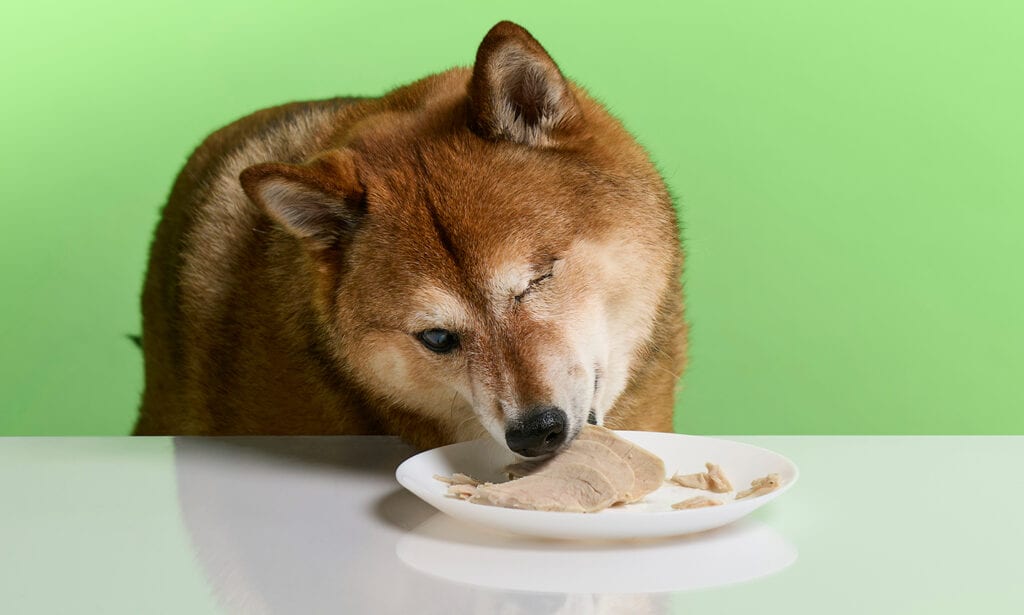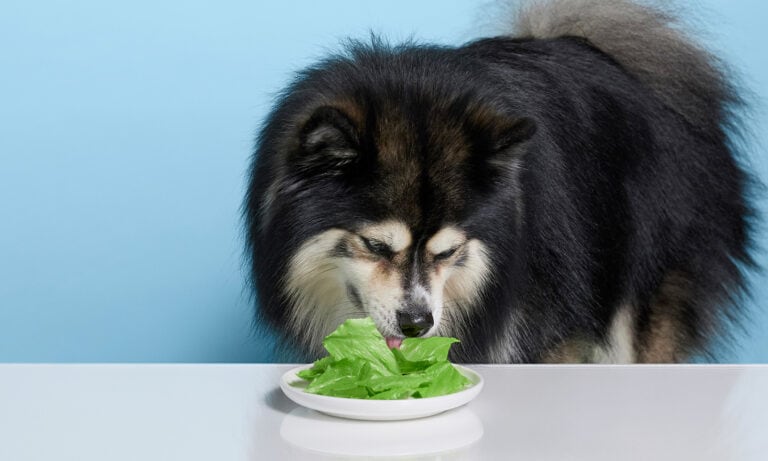Many dogs love human foods. There’s no doubt about that. But food scraps don’t always agree with them. Some can cause digestive upset, while others can be downright toxic.
But can dogs eat turkey? It’s often included in dog food, but is giving them a piece of turkey from your table the same thing? While turkey is safe for dogs–good for them, too, actually–it doesn’t mean you should go overboard with the table scraps (yes, that includes during Thanksgiving!).
We talked to two veterinary experts about the benefits and risks of turkey for dogs, how to safely feed turkey to dogs, and more.
Can Dogs Eat Turkey?
Click to jump to each section.
Is Turkey Good for Dogs?
The short answer is, yes, turkey is good for dogs. However, it’s important to be mindful of how much turkey you’re giving your dog—and how you’re giving it to them.
Before getting into that, though, let’s look at the health benefits and potential risks of adding turkey to your dog’s diet.
Benefits of Turkey for Dogs
It’s lean and high in protein
The biggest benefit of turkey is that it’s a good source of high-quality protein, which is essential for muscle development, repair and overall growth in dogs, according to Dr. Bethany Hsia, DVM, veterinarian and co-founder of CodaPet in Fresno, California. And just like with humans, high-protein foods can help your dog feel full and satisfied.
It’s low in fat
Skinless turkey is also lower in fat than other forms of meat (like ham, for example) so your dog’s gastrointestinal system can tolerate it better and it’s less likely to cause digestive issues. This also makes it more suitable for dogs on a low-fat diet or those prone to weight gain, says Dr. Hsia.
It’s rich in vitamins and minerals
In addition to amino acids, turkey is a good source of several vitamins and minerals, which are vital to maintain your pet’s health. The most notable of these vitamins and minerals are:
- Zinc
- Selenium
- Magnesium
- Sodium
- B vitamins
- Niacin
- Potassium
- Phosphorus
Together, these nutrients can provide energy; help maintain a well-conditioned coat; and support muscle and nerve function and heart and bone health.
It’s highly motivating
Veterinarian Dr. Leslie Sinn, DVM, ACVB, CPDT-KA, certified personal trainer and founder of Behavior Solutions in Ashburn, Virginia, says turkey is also a highly motivating food because most dogs find it delicious.
Because of this, it can be used as a dog treat to help with training.
Risks of Turkey for Dogs
But what about the risks? Is turkey bad for dogs? Turkey meat itself doesn’t come with inherent risks, according to Dr. Sinn; the risks mostly come from the bone.
It’s a choking hazard
Similar to chicken bones, turkey bones can easily splinter, which can cause choking, intestinal blockages or internal injuries.
It can lead to upset stomach or pancreatitis
Be mindful of the fat content of different types of meat. Dark meat is higher in fat and calories than white meat. The skin is also high in fat.
High-fat foods are harder on your dog’s digestive system and are more likely to cause health problems.
If you feed your dog too much dark meat with the skin on it, it can cause an upset stomach or lead to pancreatitis, which is inflammation of the pancreas.
Your dog may be allergic
There’s also the potential for food allergies, says Dr. Hsia. While a turkey allergy in dogs is rare, it is possible. Watch for itchiness, vomiting, and/or excessive biting and scratching of the paws and skin.
How to Safely Feed Turkey to Dogs
Here are preparation tips to follow when feeding turkey to dogs, according to Dr. Sinn:
- Stick to lean meat. Dark meat is higher in calories and fat, which can be harder for your dog to digest and can throw off their normal diet.
- Remove the turkey skin and bones, for the reasons we mentioned above.
- Serve only plain and completely unseasoned turkey. Avoid salt and dressings, and try to serve it as lean and wholesome as possible, says Dr. Sinn.
- Don’t serve raw turkey. Raw-food diets can increase the risk of food poisoning from bacteria like salmonella, so cook the turkey thoroughly before giving it to your dog.
As for how much you should be feeding? That really depends on the dog. While you don’t want to give large quantities to any dog, the math breaks down differently for large and small dogs.
Dr. Hsia says turkey should only be given as an occasional treat or added to your dog’s food, and should not exceed 10 percent of their daily calorie intake.
To put that in perspective, here are the estimated amounts of turkey based on your dog’s weight and calorie needs:
10 pounds
200 to 275
1/2 ounce per day
20 pounds
325 to 400
1 ounce per day
50 pounds
700 to 900
2 ounces per day
70 pounds
900 to 1,050 calories
2.5 ounces per day
90 pounds
1,100 to 1,350 calories
3 ounces per day
FAQs About Turkey and Dogs
Q:
Should dogs eat turkey bones?
A:No, you should not give your dog turkey bones.
As a general rule, you should never feed your dog cooked bones, since they can splinter easily and pose a choking hazard or cause internal injuries in the digestive tract. Poultry bones are especially brittle, so they’re more likely to break into small pieces.
Q:
Can dogs eat turkey bones?
Q:
Can puppies eat turkey bacon?
A:No, puppies should not eat turkey bacon. It’s often highly processed and may contain additives, Dr. Hsia says. Salt is also a common ingredient in turkey bacon.
Because of this, it’s best to avoid feeding turkey bacon to puppies and opt for plain, cooked turkey instead.
Q:
Can dogs eat turkey bacon?
Q:
Can dogs eat ground turkey? Is ground turkey good for dogs?
A:Yes, dogs can eat ground turkey as long as it’s lean and cooked thoroughly without any seasonings or additives, according to Dr. Hsia.
Ground turkey has the same vitamins and minerals as regular turkey meat, so it also provides the same health benefits and can be good for dogs.
Q:
Can–or should–dogs eat turkey necks?
A:Dr. Sinn advises against dogs eating turkey necks.
While some people do feed turkey necks to their dogs because they’re slender (the idea being that if you cook them thoroughly, the bones will be soft enough that your dog can crunch them up and eat them without issues), but Dr. Sinn cautions there’s always a chance that a fragment or piece of bone can splinter and cause problems.
Q:
Can dogs have turkey lunch meat? Can dogs eat turkey sandwich meat?
A:Not really. Some natural deli meats have turkey meat and no other ingredients, while most contain additives, like preservatives and flavoring.
Unless you’re positive that the lunch meat you have has a super-clean ingredient list (basically turkey only), it’s best to avoid giving it to your dog.
Q:
Will turkey make my dog sleepy, too?
A:There’s a theory that turkey can make you, and possibly your dog, sleepy because of its tryptophan content. Dr. Sinn says the idea came from the fact that the body uses tryptophan to make serotonin, which makes you feel relaxed and sleepy.
Experts point out most people would never eat enough turkey in one sitting to actually feel these physiological effects. And while there haven’t been studies on dogs and turkey, Dr. Sinn says it’s unlikely that turkey will make your dog sleepy.
It’s possible the overeating itself may contribute more to a dog's sleepiness than the consumption of turkey alone, Dr. Hsia says—just like with humans.
More human foods dogs can eat:
Share:

















